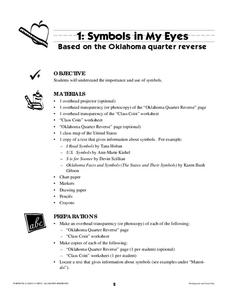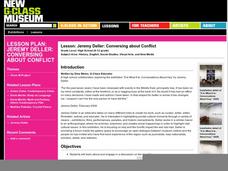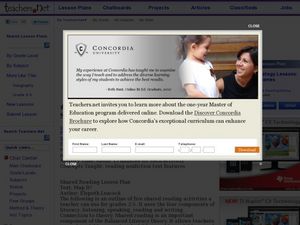PBS
Universal Declaration of Human Rights
What rights are guaranteed to students? Do they align with the Universal Declaration of Human Rights, which was approved by the United Nations in 1948? Middle and high schoolers present persuasive arguments about the rights they believe...
Federal Reserve Bank
Ten Mile Day
Get your class working on the railroad with this detailed and interactive lesson. After reading and discussing Ten Mile Day, learners explore division of labor, human capital, and productivity with a hands-on group activity in which they...
PBS
Muhammad Ali: Boxer and Civil Rights Activist
Many young people today know Muhammad Ali as the aging boxer who lit the torch at the 1996 Olympics. Introduce young historians to Ali the boxer, the Civil Rights activist, the war protestor, and the humanitarian with a powerful lesson...
Teaching Tolerance
You Are the Product
What does it mean for a product or service to go viral? Scholars explore the topic by reading an article about the economics of social media. After reading, they complete a 3-2-1 data chart with information they learned from the text and...
K20 LEARN
Watch Your Tone: Tone Analysis Through Music And Nonfiction
Identifying the tone of a piece of writing or the author's attitude toward the subject matter can be difficult for learners. Simplify the process with a lesson plan that begins with skits, moves to songs and their lyrics, and then to...
US Mint
Symbols in My Eyes
Explore the hidden meanings behind the images on US currency with this elementary school lesson on symbolism. Starting with a class discussion about symbols, children go on to brainstorm different objects that represent the Unites States...
What So Proudly We Hail
Life, Liberty, and the Pursuit of Happiness: A Lesson on the Declaration of Independence
What does it mean to say that a right is unalienable? How did the founding fathers convey this revolutionary concept in the Declaration of Independence? Engage in a close reading and analysis of the Declaration of Independence, and...
Curated OER
My Reading Words in My Social Studies Book?
Connect social studies and language arts using this resource. After studying root words, have learners locate five words from their social studies book that have a prefix, suffix, or root word. This puts a new twist on practicing basic...
Curated OER
Lesson: Emory Douglas: Revolution in Our Time, Part 2
I love lessons like this because they let kids see the power of art, poetry, and activism in times of social injustice and unrest. They'll analyze the art used by Emory Douglas in the production of the Black Panther newspaper and...
National Endowment for the Humanities
Revolution '67, Lesson 2: What Happened in July 1967? How Do We Know?
Even in a world in which dozens of participants and curious onlookers record every controversial event, the basic facts of what happened are often in dispute. Revolution '67, Lesson 2 explores 1967 Newark, New Jersey using an examination...
Benjamin Franklin Tercentenary
From Ben’s Pen to Our Lives
What would Ben do? Jumping off from the pseudonymous letters Ben Franklin fooled his older brother into publishing when he was still a teenager, young literary lovers dive into acting, writing, and addressing a local issue with wit and...
Curated OER
Lesson: Jeremy Deller: Conversing about Conflict
Bridge cultural awareness, community, government, and art with an introspective and thought-provoking lesson. Upper graders become globally and socially aware as they analyze and explore the art of Jeremy Deller. They consider his images...
J. Paul Getty Trust
Expressing Emotions through Art Lesson 1—Everyone Shows They Care
In a instructional activity that explores art and emotions, scholars analyze a piece of art and discuss which emotions it portrays. They go on to reflect on their own emotions and how they are similar to the feelings expressed...
PBS
Lessons in Leadership, Roosevelt Style
It's easy to criticize those in power until you're sitting at their desk, faced with the same decisions. A history lesson prompts secondary learners to research the Roosevelt presidencies through the lens of leadership and...
Curated OER
RBG Dr. Martin Luther Jr. Studies Lesson Plan-Guide
Explore Martin Luther King Jr. Students listen to a speech given by Martin Luther King, and interpret his message. They discuss civil rights and how Martin Luther King Jr. exhibited good citizenship, then brainstorm ways in which they...
Curated OER
Martin Luther King and Writing as a Tool for Social Change
Students explore writing as an agent for social change. In this Social Studies lesson, students examine the power of writing using Dr. King's Letter from a Birmingham Jail. Students will practice the technique of persuasive writing by...
Curated OER
Using Social Studies in Five Shared Reading Lessons: Geography
After several short 15-minute mini-lessons, your learners will gain an understanding of the characteristics of a non-fiction text. Using the book Map It by Elspeth Leacock, your class will become acquainted with non-fiction terms such as...
Channel Islands Film
Dark Water: Lesson Plan 1 - Grades 3-4
As part of their study of the history of the Channel Islands, class members craft an informational article to post on a bulletin board that features the Chumash ancestral tradition of tomol paddling.
Daughters of the American Revolution
Lesson 1: How Do Society’s Expectations Influence Education?
The history of women's education can be traced back to the delicate stitching of student samplers from the 19th century. Modern-day pupils examine and analyze four primary sources, three of which are images of embroidered samplers, which...
Channel Islands Film
Cache: Lesson Plan 1 - Grades 9-12
Archaeologists have discovered a cache of Native American relics. They want to preserve these relics by removing them from the rapidly eroding site to a lab where they can be studied. Native American traditions demand that the items be...
Urban Education Exchange
Lessons and Units: The Watsons go to Birmingham—1963 5TH GRADE UNIT
Get ready to read The Watsons Go to Birmingham - 1963 with a lesson about historical fiction. Spanning several centuries, the resource prompts learners to guess the historical era of a story based on a word or phrase in the text. In...
Teaching Tolerance
In Our Own Words: A Story Book with a Purpose
Academics turn into storytellers in an engaging activity on activism. The activity focuses on promoting social change in local communities with stories. Young historians plan a storybook to target a specific audience and social issue and...
Teaching Tolerance
The War on Drugs—Mechanisms and Effects
The war on drugs doesn't have definite results. An interesting lesson examines the social, political, and economic effect of the war on drugs. Academics learn how the war on drugs has led to mass incarcerations and negatively affected...
US National Library of Medicine
Science and Society: Preventing the Spread of Disease
Looking for a valuable resource on the spread of infectious diseases? Here is a lesson in which pupils simulate the spread of diseases and learn about how to prevent them from spreading. Class members read case studies about diseases,...
Other popular searches
- Esl Social Studies Lessons
- Social Studies Lessons Rome
- Social Studies Lessons Japan
- Social Studies Lessons on Maps

























